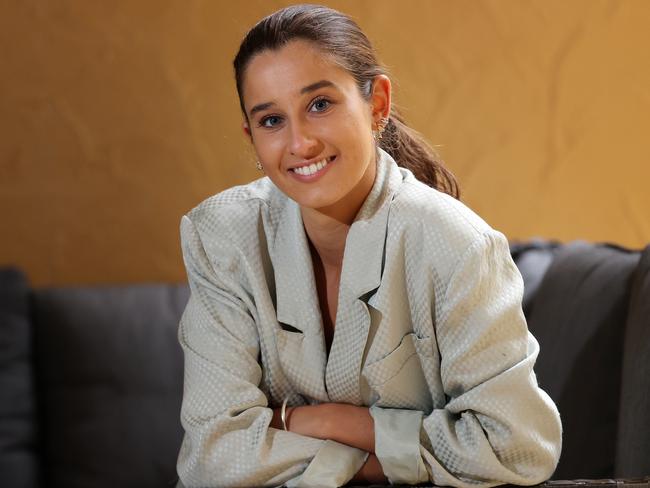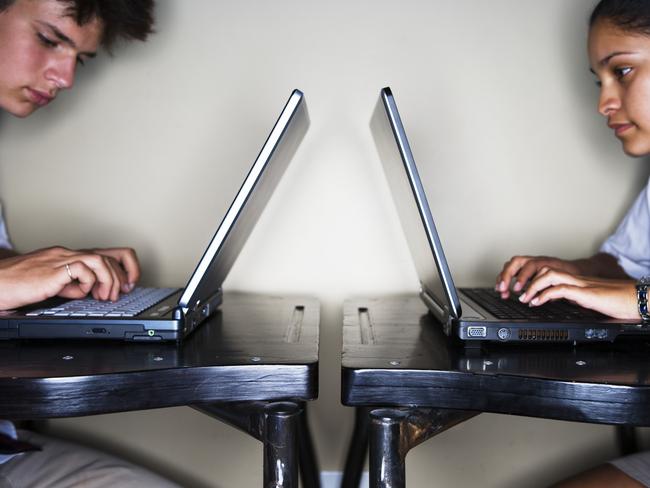Consent Campaigner Chanel Contos calls for high school students to learn dangers of porn
High school students would take porn literacy classes under a push by one campaigner, who says kids as young as 11 are regularly exposed to X-rated material.
Education
Don't miss out on the headlines from Education. Followed categories will be added to My News.
A leading consent campaigner is calling for high school students around the country to undertake porn literacy classes, saying the rates of young teens accessing explicit material had become a “public health issue”.
Teach Us Consent founder Chanel Contos said school leaders talking about the dangers of pornography to pupils was the “next step” for secondary classrooms.
“It’s been something that has been quite taboo in the public space, but the rates of young people accessing it (porn) from a young age is becoming a public health issue,” Ms Contos said.
“The average age of first access to porn in Australia is now 11 years old and most of the time it’s accessed accidentally because porn sites advertise in chat rooms and while playing games online,” she said.
Ms Contos, who has written the book Consent Laid Bare, said porn literacy involved speaking to students about what pornography is and how students can seek help if they accidentally come across it.
“It’s about teaching young teens that it’s not real life and then when they’re older and more likely intentionally accessing pornography, teaching them how to do so with a critical lens to understand that this isn’t a depiction of real life and things like pornography never exhibits consent.”

In May last year, consent education became mandatory for all schoolchildren across Australia.
This came after tireless campaigning on the issue, which was spearheaded by Ms Contos.
She said feedback from students about consent education had been “overwhelmingly positive”.
“There’s lots of stories from parents and teachers talking about how they’re delivering consent education and how they’re having these important conversations,” she said.
“Lots of young men talking about them reflecting on their friends’ behaviours.
“I think it was a really true grassroots campaign and that was really exciting because we have that grassroots change in culture at the same time and the policy change.”
Ms Contos said she would like to see her book, which covers topics including consent and image-based abuse, included as part of the high school curriculum.
“There’s been so many people reviewing the book saying this should be part of the curriculum.”
Ms Contos’ pleas come as federal budget papers show a drop in future funding for consent education.
About $20m has been budgeted for this financial year and $20m for next year for national consent and respectful relationships education, but this drops to $8m by mid-2026 and beyond.
Victorian state funding for respectful relationships, which is $39m a year, will continue.

Kids First Australia prevention and recovery general manager Jackie Bateman said she supported porn literacy being taught in secondary classrooms.
“There is a very high rate of young people accessing pornography,” Ms Bateman said.
“Pornography is becoming the default platform for them to understand and navigate what healthy consenting sexual relationships look like.
“Quality sex and consent education leads to young people having sex later, taking fewer risks and being more likely to use contraception.”
Victorian Education Minister Ben Carroll told the Herald Sun he supported Ms Contos’ call for pornographic literacy to be included in the curriculum to “explore pornography and its impacts”.
“The work we’re doing with academics and consultants will include updating content exploring pornography and its impacts,” Mr Carroll said.
“There’s no doubt that online pornography can lead to misogyny and really poor behaviour, and it’s why we need to embed it and do what we can to ensure all students feel safe and supported,” he said.
Federal Education Minister Jason Clare said it was “important” that young people were equipped with age-appropriate, evidenced-based education that improves their health, safety, wellbeing, and dignity.
“Teaching quality respectful relationships education helps students develop the social and emotional skills they need to form healthy relationships and ideas about acceptable relationship behaviour,” Mr Clare said.



